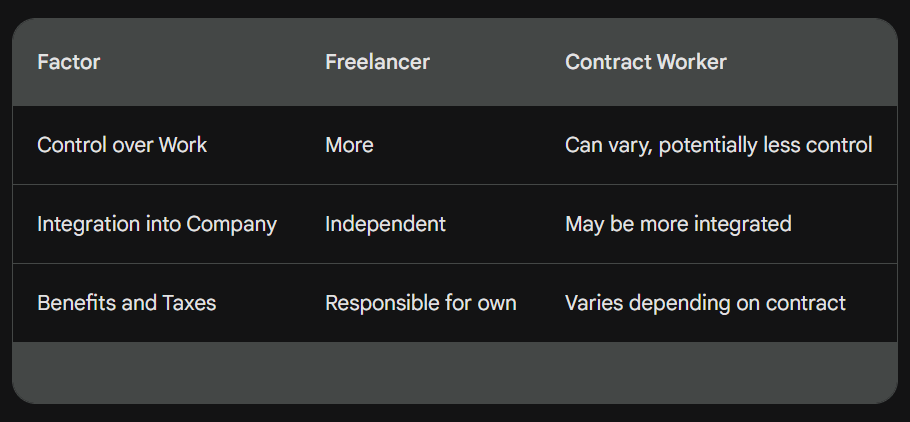
When hiring, every company nowadays needs to consider freelance vs contract workers. Virtual teams are the name of the game in this digital world, and functional distinctions are emerging. In this post, we’ll go over who freelancers and contractors are. We’ll talk about how they are different and how to hire and manage them effectively.
Understanding the Basics
Freelance Key Characteristics and Typical Work Arrangements
Freelance workers, also sometimes referred to as freelancers or independent contractors, are individuals who are self-employed. They work for themselves rather than for a single employer. They offer their skills and services to clients or businesses on a project basis, contract basis, or hourly basis.
Freelancers are responsible for finding their own work, managing their own time, and taking care of their own business expenses. This includes the equipment they use for work, their business taxes, and sometimes the software they need. Freelance work is typically not a permanent position. Freelancers contract with clients to complete specific projects or tasks, and the working relationship ends once the project is finished.
Freelancing encompasses a wide range of professions and skillsets. Writers, designers, developers, marketers, consultants, and many other professionals can find freelance work in their respective fields.
Perhaps the biggest benefit of freelance work is the flexibility and control it offers. Freelancers can choose their projects, set their own hours, and work from anywhere with an internet connection. They have the autonomy to make their own decisions and build their own business, too. Freelancing also opens up a wide range of project and client opportunities, which can keep work interesting.
The main challenge with freelance vs contract work is income instability. Freelancers don’t receive a regular paycheck and their income can vary depending on the availability of work. Moreover, freelancers are typically responsible for their own health insurance, retirement savings, and other benefits. Freelancing also requires a high degree of self-discipline and time management skills. More than staying alive, freelancers must stay on top of deadlines and often manage multiple projects to be lucrative.
Contract Worker Key Characteristics and Typical Work Arrangements
Contract workers, also known as independent contractors, share many similarities with freelance workers (defined previously). Both contract workers and freelancers are not regular employees of a company. They are self-employed, and typically don’t have permanent positions. They contract with companies or clients to complete specific projects or tasks.
The term “contract worker” can sometimes encompass a broader range of workers compared to “freelancer.” Where freelance vs contract workers mainly differ is in their level of control, relationship with clients, and legal classification.
Contract workers might have slightly less control over their work compared to some freelancers. For instance, a company might dictate specific work hours or require the contractor to be on-site for the project, even though they are not a permanent employee. The specific terms of a contract worker’s agreement with a company can vary, too. In some cases, the level of control a company exerts might be closer to that of a traditional employer-employee relationship, with the key distinction being the temporary nature of the work.
The legal classification of a worker as a freelancer, independent contractor, or employee often has tax and legal implications. Because the specific distinction can be blurry, it’s crucial to consult with a tax advisor to understand your obligations.
Legal Considerations of Freelance vs Contract Work

The legal distinctions between freelancers and contract workers can be nuanced, and the terms are often used interchangeably. However, there are some key factors that legal professionals and courts consider when classifying a worker.
Freelancers generally have more control over how they perform their work. They choose their methods, tools, and schedule. They are compliant as long as they deliver the agreed-upon results. A hiring entity likely dictates specific work hours and tools or methods for contract workers to use, though.
Freelancers typically work independently and are not integrated into the company’s structure or hierarchy. They provide their services for a specific project and are not involved in the company’s daily operations. They may still be asked to comply with company culture, however. This is especially true if their work requires them to collaborate closely with others. Contract workers tend to be more integrated.
Because they are usually considered business owners, freelancers are responsible for their own taxes and benefits, like health insurance. They typically receive a 1099 form from the companies they work with. The classification for contract worker taxes and benefits can vary. It usually hinges on the specific contract and level of control that the company exerts. In some cases, contract workers might receive a W-2 form and be eligible for certain benefits.
Here’s a table summarizing the key distinctions:

Note that the specific legal classification can be complex. Consult with a tax advisor or legal professional to determine the appropriate classification for your specific situation.
Some government agencies also offer resources to help classify workers. For instance, the US Department of Labor has an online classification tool. This keeps you out of trouble when the lines between freelancers and contract workers blur.
Pros and Cons
Advantages of Hiring Freelance vs Contract Workers
Hiring freelancers can be ideal for companies that value independence and a flexible work style. Freelancers often work on a wider variety of projects with different clients. This can be beneficial for companies who want to bring in some exposure from diverse assignments. This is also true in terms of teaching other team members about a faster-paced work environment.
In some cases, hiring freelancers might be a more cost-effective option for businesses. This is because freelancers are generally responsible for their own taxes and benefits. With contract workers, agreements might include some benefits. The freelance marketplace offers a vast pool of talent with niche specializations. This can make the cost of hiring a freelancer more palatable. For example, businesses can find freelancers with unique skills and expertise that might be difficult to source locally. That makes them invaluable. Sometimes, you can only find contractors through traditional hiring channels. Freelancers are all over the internet.
Note that the specific advantages of freelance vs contract hires can vary greatly. Look at the nature of the work, the contract terms, and the individual preferences of both the worker and the business. Carefully assess your project needs and consider your budget and work style compatibility, too, when deciding between the two.
Disadvantages of Hiring Freelance vs Contract Workers
While freelancers offer benefits like the above, there are also some drawbacks to consider when comparing them to contract workers.
Freelancers are self-directed, so managing their work can be more challenging. You might have limited oversight over their daily tasks and work schedule. This can be a concern for projects requiring strict adherence to specific protocols or deadlines.
Clear and consistent communication is crucial when working with remote freelancers. Time zone differences and asynchronous communication can create challenges in collaboration and project management. This is not true of contract workers, who are usually more readily available for real-time communication.
The quality of work can vary significantly among freelancers. While platforms and portfolios can help assess skills, in-depth screening and reference checks are important. This ensures that freelance hires possess the necessary experience for your project. Sharing confidential information with freelancers also requires strong security protocols. Consider putting non-disclosure agreements in place to mitigate security risks.
Freelancers might have different work styles or approaches compared to your in-house team. Ensuring consistency in quality, tone, and formatting across projects can require additional effort and clear communication.
Consider, as well, availability for ongoing projects or future collaborations, since freelance workloads fluctuate. They might prioritize other clients with more urgent needs if you don’t have a standing agreement, disrupting your project continuity. When that happens, transitioning the work to a new freelancer can be time-consuming and disruptive. This is especially true if a project requires institutional knowledge specific to your company. A contract worker who might be integrated more closely with your team can be the better option here.
Carefully weigh the trade-offs between freelancer advantages and potential management challenges. For projects requiring strict control and long-term collaboration, contract workers might offer the greater advantage, but not always.
Hiring Process and Best Practices

Before hiring, clearly identify the skills, experience, and deliverables you need for the project. This will help you target the right talent pool and write clear job descriptions. Consider the level of control you require and the benefits you’re willing to offer. Use a combination of methods like freelance platforms, professional networks, and job boards to find qualified candidates.
During the hiring process, clearly and concisely outline the project scope, deliverables, timeline, payment terms, and required skills. Screen candidates thoroughly by reviewing portfolios, conducting interviews, and checking references. This is how you can evaluate skills, experience, and cultural fit before doing a trial run.
Always formalize the hire with a written agreement. Specify the scope of work, payment terms, ownership of intellectual property, confidentiality clauses, termination clauses, and the like. Set clear expectations on project goals, deadlines, milestones, and communication protocols, too, to avoid misunderstandings. Establish regular communication channels and touch points to keep the project on track. Maintain communication to address concerns promptly. Offer constructive feedback throughout the project duration and provide resources and support as needed.
Take advantage of freelancer tools and platforms to streamline the hiring and management processes. Consider starting with a smaller project to assess a freelancer or contract worker’s skills and compatibility. Then you can more safely commit to a larger engagement later.
Management and Collaboration
Effective management of freelance and contract workers is crucial to ensure successful project completion and positive working relationships.
Integrate all hires through proper onboarding. Invest the time to familiarize them with your company culture, project goals, workflows, and communication protocols. Provide clear documentation and resources to get them started quickly. Give them a detailed project scope document specifying deliverables, milestones, deadlines, and acceptance criteria. This minimizes confusion and ensures everyone is on the same page.
Set clear and achievable deadlines considering the freelancer’s workload and the complexity of the project. Factor in buffer time for potential revisions. Implement regular feedback mechanisms to provide constructive criticism and course corrections throughout the project. This improves quality and ensures alignment with expectations. Establish clear quality assurance processes to review deliverables and ensure they meet the agreed-upon standards before final acceptance and payment.
Define payment terms in the contract, including payment schedule, milestones tied to payments, and payment methods. Consider using online payment platforms for secure and timely transactions. If you’re doing hourly projects, establish clear time tracking procedures for accurate billing. Reliable payment builds trust and encourages long-term collaboration.
Respect and appreciation go a long way. Treat freelancers and contract workers with dignity and thank them for their contributions. Value their expertise and communicate openly throughout the project. Implement periodic performance reviews and identify areas for improvement in the working relationship.
If you find a talented freelancer or contract worker, develop a positive working relationship to encourage ongoing collaboration. Most freelancers will commit if they see the advantage in building loyalty with you. If a freelancer or contract worker performs well, express your interest in working with them again on future projects. Building a pool of reliable freelancers can streamline your workforce management. This way, you get all the advantages of their broader experience and knowledge plus the stability of contract hires. Consider offering opportunities for professional development or skill-building resources to your freelance and contract worker network, too.
What Is Outsource School?

Outsource School helps you to unlock the potential of virtual assistants and accelerate your business growth.
This is the exact system Outsource School’s founders, Nathan Hirsch and Connor Gillivan, used to go from zero to 8 figures and 40+ virtual assistants with an exit in 2019.
Since being founded in 2020, Outsource School has helped 1,000+ business owners hire 2,000+ virtual assistants for their companies.
Schedule a free sales call to learn more
Free resources you might like:
- Outsource School Case Study: How We Scaled to 45+ VAs and 8 Figures in Revenue
- Free VA Calculator | See How Many VAs You Can Afford
- Free Training on 5 Keys to Working With VAs
- Learn Outsourcing 101 | Guides, Downloads, and Checklists
Conclusion
Hiring freelancers and contract workers can be a rewarding experience for businesses of all sizes. By following these best practices, you can increase your chances of finding qualified talent and building successful working relationships. Then you can manage projects effectively over the long term.






